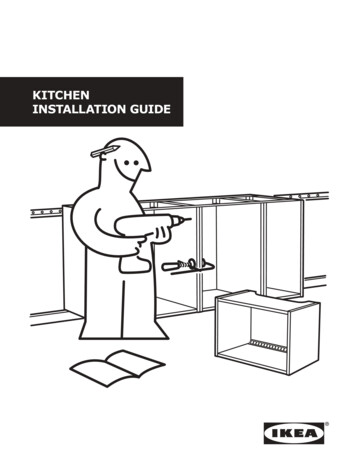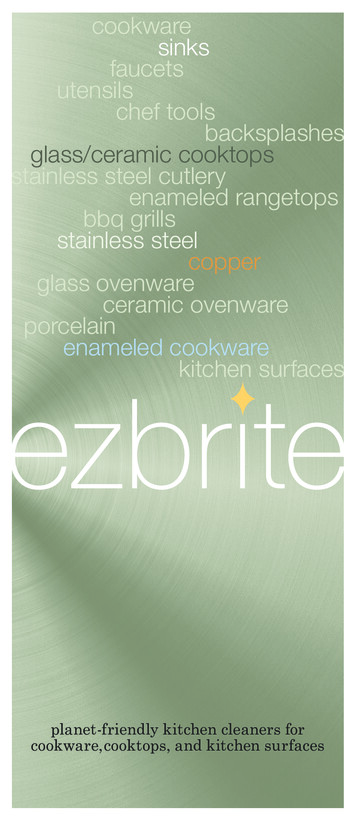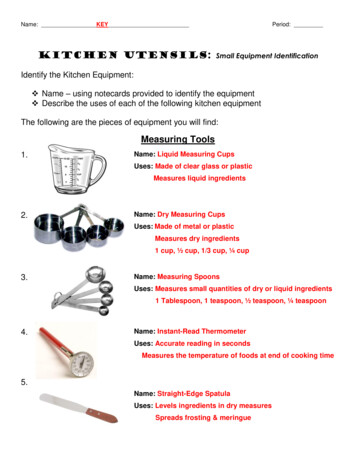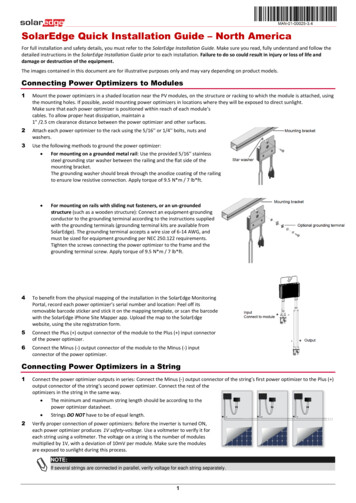
Transcription
KITCHENINSTALLATION GUIDE
The step-by-step guide to installingyour new kitchen rightThis brochure is your guide to preparing and installingyour new kitchen. Inside you’ll find tips and ideas, clearsteps to follow, and the tools you’ll need. Use this guidealong with your assembly instructions to make sureyour kitchen is installed correctly.You can do it yourself but you don’t have toOur kitchens are designed to be simple to install andassemble yourself, but we’re here to help as muchas you would like along the way. Whether you’d like ahand with delivery or a complete installation service,we’re happy to put together a service package thatsuits you. For more details, see the kitchen section ofIKEA-USA.com or contact your local IKEA store.Before you beginTake a look at this brochure to see what steps areinvolved in installing your new kitchen and organizewhat tools you’ll need.Once you’ve received your kitchen, double-check thatall the parts have arrived. A good way to do this is bychecking what packages you have at home against theorder list. You should only dismantle your old kitchenwhen you have all your new parts and appliances.Your kitchen parts and countertop should be storedindoors, with normal room temperature and humiditylevels. It’s helpful if you arrange your cabinets in theorder you will be installing them. Use your shopping listand IKEA home planner drawing to help you.Remove your old kitchen making sure that electric,water and gas are off before you begin. Use a qualified,licensed professional to disconnect and connect yourgas, water, and electricity.Once your kitchen arrives, check off your delivery to seethat everything is in order.2
The materials and tools you’ll needThe tools you’ll need depend on how much of yourkitchen you are doing yourself. See the assemblyinstructions for the tools you’ll need to use. It’s a goodidea to wear safety glasses when using power tools.GOOD TO KNOWPlaster, wood or concrete, there are many differenttypes of walls. Fastening hardware is not suppliedwith your cabinets. Most hardware or homeimprovement stores stock appropriate fasteninghardware and can help you choose what is right foryour walls.Fine-toothed handsawLevelBar clampsMeasuring tapeMiter box and sawFlatscrewdriverCircular sawPhillipsscrewdriverAwlPencilRubbermalletClaw HammerElectric screwdriver/drillSquareHole cutter – fordrilling the holefor the faucet inthe sink.Jigsaw3
Prepare your roomOnce you have removed your old kitchen, prepareyour room by making sure your walls and floorare even, and that your walls are suitable forsupporting your new kitchen. Now is also thetime to prime and paint your walls, put in tiles orchange your flooring.Marking cabinet positionsDraw a layout of your new kitchen directlyon the wall. Check that everything fits withthe measurements from your plan and yourelectricity, water, gas, and ventilation connectionsare where you want them. Also mark where toattach your new kitchen’s suspension rails.Prepare your space by making sure your corners are even and your walls and floor are squareand plumb. Use your square for the corners and a level for the walls and floor. Make sure younote the highest point of the floor and where the corners are not square.Check that your wall is strong enough tohang your suspension rail and cabinets.Depending on your wall material, it’s bestto install your rail onto a stud or a supportbeam. An electronic stud finder can behelpful.Make sure you leave 32 3/16”between the highest point ofyour floor and the bottom ofyour base suspension rail.Double-check that your plumbing is where youwant it and fits with your layout plan.4
Set your suspension railWith the new IKEA kitchen system, your cabinetscan be hung directly onto a suspension railmaking them easier to install and easier to adjust.It’s important to make sure your suspension rail isstraight and level, and to secure it with the rightscrew type for your wall.Fasten your rails, base rail first. Make sureyou’ve found suitable points in the wallwhere the rails can be fastened and that therails are level before drilling.Marking the right height for yoursuspension railYour base suspension rail needs to be hung32 3/16" above your floor’s highest point (measureto the underside of the rail). You should allow22 5/16" between the bottom of your wall cabinetsand the bottom of your base rail when measuringfor your upper rail.If your wall is uneven use shims betweenthe rail and the wall to make sure the rail isflush.82 3/16"Use a level to check that each rail is level.27 11/16"Take a coffee. With your kitchen layout drawn and your suspension railsup, you’ve completed the preparationstage for your kitchen.32 3/16"5
Install your cabinetsIn most kitchens it’s best to install your wallcabinets first. This will allow you to move aroundwithout base cabinets in the way. One exceptionis if you are installing a single line kitchen with ahigh cabinet at one end. In this case install thehigh cabinet first.Before you begin, mark down all plumbing andother utilities. Some cabinets have ready-madeopenings for plumbing and utilities, but you canuse a jigsaw to create your own openings, ifneeded. Do this before fitting the cabinet in place.Be aware that these openings can affect how youcan arrange drawers in a cabinet.Assemble all wall cabinet frames accordingto the assembly instructions. Wait until laterbefore fitting drawers, doors, and internalfittings.Hang the corner cabinet first and secure bytightening the screws. Hang the remainingcabinets and connect them with the includedscrews. Wait to tighten the screws untilthe base cabinets are in place and you canensure alignment.Hang your base cabinets starting in thecorner. Hang all remaining cabinets in thesame way. If you’re installing a cornercarousel now is the time to place it in thecabinet.Cabinet legs connecting two cabinets can be used to support both cabinets while you’reinstalling. Remember to use the distance ring included with the legs.Make sure the correct base cabinet isaligned with your plumbing.Check that each cabinet is aligned with theprevious cabinet by adjusting the legs.6Assemble all base cabinets according to theassembly instructions. Make sure to havethe legs attached in the order the cabinetswill be installed.If you are using a high cabinet, attach thecover panel first.
Check the wall with your level to see if it isstraight. If the wall is even, measure betweenthe wall and the cabinet and mark this distanceat the top and bottom of the filler piece.Filler piecesFiller pieces are used between yourcabinets and walls for a streamlinedappearance and to ensure there isenough room to fully open doors anddrawers. They are especially useful ifyour walls are not perfectly straight.If the wall is not level and flat, the filler piece must be cut to fit to the wall’s shape. To do this,you’ll need a filler piece, measuring tape, small block of wood about 1 1/4" thick and a pencil.Cut the filler piece so it’s the same height as the cabinet. Place the edge of the filler pieceagainst the wall. Hold the block of wood flat against the wall with the pencil against it. Keepthem pressed against the wall as you slide them down the length of the filler piece. Now youhave traced the shape of the wall onto the filler piece. Cut along your trace line.Place the newly cut edge of the filler piece against the wall, it should fit perfectly. Mark theedge of the cabinet on the top and bottom of the filler piece. Draw a straight line from thesepoints and cut.To ensure the filler piece stays in place, firstattach a support strip to the wall. Drill holesin the cabinet for the screws you’ll use toattach the cabinet and filler piece together.Put the filler piece into place. Put screwsthrough the holes you have drilled. When allyour filler pieces are in, caulk around eachone with silicone for an airtight seal.If you are going to install a high cabinet,don’t make final adjustments or fullytighten the screws until you have installedall the other cabinets.GOOD TO KNOWIf you’re installing a kitchen island, itmust be secured to the floor using UTBYlegs or by building a frame. Fasten theframe to both the floor and the cabinets.When attaching the frame to the floor beaware of amenities like floor heating orplumbing already installed.7
Install your worktop, sink, lighting,appliances, and kitchen island.With your cabinet frames in, it’s time to installyour countertop, sink, lighting, and appliances.Check that your countertop is the correct sizebefore fitting it in place. Now is also the time ifyou need to customize your countertop for a sinkor cooktop, see your assembly instructions forhelp.Once your countertop is in, you’re ready toget your water, gas, lighting and appliancesconnected. All water, gas, and electricityconnections must be done by qualified, licensedprofessionals according to valid local safetyregulations.All electrical connections must be made by aqualified, licensed electrician.Install your lighting and appliances.Measure your countertop. If you have a precut countertop, now is the time to cut itto the right length.Use a circular saw and bar clamps to hold astraight-edge to your pre-cut countertopwhen you cut to customize the size. It’shelpful to use a pair of sawhorses.Mark a spot for the sink by laying thecountertop in place. Trace the inside ofthe base cabinet onto the underside of thecountertop. This helps you align your sink.Turn your countertop over and trace theoutline of your sink onto masking tape.Use a jigsaw to cut out space for your sink.It’s helpful to drill a hole on the insidecorners of your outline before cutting, soyou can make a cleaner cut.To prevent moisture from penetrating thecountertop apply polyurethane siliconeacross the sawn edges.Install sink into the countertop according tothe assembly instructions.Secure your countertop in place according tothe assembly instructions.8
Customize your countertop for your cooktopin the same fashion as for your sink. Seeyour cooktop’s assembly instructions forhelp.Install the extractor hood. The extractor hoods from IKEA can be installed in two ways: eithervented to the outside, called extraction, or used in recirculation mode fitted with a charcoal filter.Each installation option is described in the assembly instructions that come with the product.Saw the hole either in the back panel or in the top of the cabinet. See the assembly instructions.For safety and functionality reasons, follow precise measurements in the instructions forinstallation that come with the extractor hood/fan.Supporting brackets are used to fasten kitchen islands to the floor.Legs/toe kicks must then be fitted around the outside of the island.The kitchen island assembly kit is used to connect cabinets back toback, or for attaching a cover panel to the back of cabinets.GOOD TO KNOW:It’s important to attach a moisturebarrier under the countertop whereyou have a dishwasher. All IKEAdishwashers come with a protectivestrip. For other appliances, use a FIXAdiffusion barrier for extra protection.9
Install your shelves, drawers,doors, knobs, and handles.Now that the cabinet frames, countertops andappliances are in, attach the drawer slides intothe cabinets. Remember that the slides for innerand standard drawers are attached differently,see the assembly instructions for help.Once the slides are in, attach the drawers beforethe doors and shelves. Finish by adding knobsand handles as well as any other internalsolutions, like wire baskets.Attach the drawer slides, starting with theouter drawers. Outer drawer slides shouldbe attached to the outer row of holes in thecabinet.Once the outer drawer slides are in, attachthe inner drawer slides. The inner drawerslides are attached to the inner row of holesin the cabinet.Assemble the drawers with the help of theassembly instructions.Attach the hinges for the doors.Attach the drawers and doors to thecabinets.Align the doors to the correct height andwidth by adjusting the screws on the hingeplate.Now its time to attach a toe kick. Follow theassembly instructions for help.If using a ventilation grill, place it betweentwo pieces of toe kick.10
You’re done! Congratulationson your new kitchen!Caring for your cabinetsClean the doors, cabinet interiors, and woodsurfaces with a soft, damp cloth. Only usecleaning products intended for these materials.Do not use products that contain ammonia,alcohol, bleach, or abrasives. Rinse with cleanwater, then dry with a clean, dry cloth. Make sureto clean up spills quickly.Keep your sink sparklingAfter each use, wipe the sink clean with a clothor sponge damped in water or a non-abrasivedetergent, if necessary. Rinse the bowl with waterand wipe the sink with a dry cloth. Avoid scouringpowder, steel wool, or hard objects which canscratch the stainless steel surface. The dampsurface can be discolored if substances containingiron are allowed to remain on it.Long-lasting countertopsKeep your countertop in top condition by cleaningup spills quickly with water and a mild detergent.Be sure to keep them as dry as possible afteruse. For wood and solid wood countertops useBEHANDLA wood treatment oil. The oil protectsthe wood from marks, stains, and cracks, andprevents water from penetrating the surface.YOU’RE DONE!Time to step back and admire your newkitchen – and admire yourself for saving so much money by assembling andinstalling it yourself! With a little care andmaintenance your new IKEA kitchen willkeep looking its best for many years tocome.11
At IKEA we believe everyone has the right to a new kitchen. Apart from offering a wide range of kitchens,we also offer a wide range of services, including measuring, planning, and installation. Everything you needto make getting your dream kitchen as easy as possible. And at your local IKEA store you’ll find our team ofkitchen experts who are on hand to answer questions, give practical advice, and help you through the buyingprocess.MEASUREMENT SERVICEAn experienced professional from an Independent Service Provider willcome to your home to assess the conditions and provide accuratemeasurements. This service is available to customers living in our servicearea. The Measurement fee is refunded to you when you purchase your IKEAkitchen.MEASUREMENT AND PLANNING SERVICEA professional Measurement Technician will visit you in your home toprovide all measurement services. A Kitchen Planner will then contact youto discuss the details of your kitchen plan, and start the planning process.Performed by an Independent Service Provider. The Measurement andPlanning fee is refunded to you when you purchase your IKEA kitchen.DELIVERY SERVICEWe can arrange for an Independent Service Provider to deliver your newkitchen directly to your home or office. Prices are based on distance.INSTALLATION SERVICESave time and effort with professional installation. Kitchen Installation isprovided by an Independent Service Provider and is priced per cabinet.Services and prices may vary, please see IKEA-USA.com/services or your local IKEA store for details. Inter IKEA Systems B.V. 2015/August 2018ALL THE HELP YOU NEED TO MAKE YOURDREAM KITCHEN A REALITY
Double-check that your plumbing is where you want it and fits with your layout plan. 5 82 3/16" 32 3/16" 27 11/16" Take a coffee. With your kitchen lay - out drawn and your suspension rails up, you’ve completed the pre










